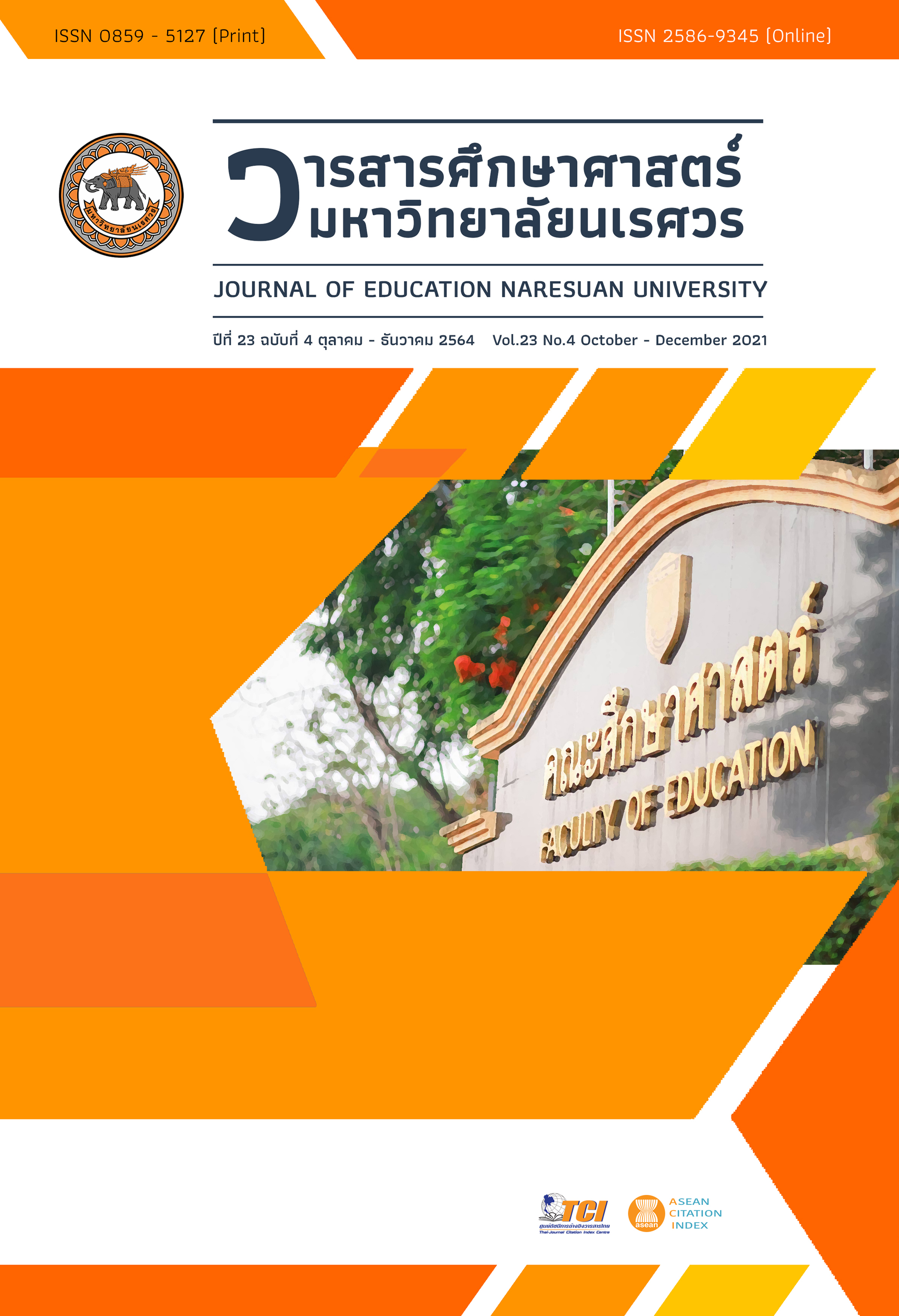EFFECT OF ARGUMENT DRIVEN INQUIRY ON SCIENTIFIC REASONING ABILITY ON THE TOPIC OF ATMOSPHERE AND WEATHER OF GRADE 7 STUDENTS ผลการจัดการเรียนรู้แบบสืบเสาะหาความรู้ที่ขับเคลื่อนด้วยข้อโต้แย้งที่มีต่อความสามารถในการให้เหตุผลเชิงวิทยาศาสตร์ เรื่อง บรรยากาศและลมฟ้าอากาศ ของนักเรียนชั้นมัธยมศึกษาปีที่ 1
Main Article Content
Abstract
This research was aimed to study the effect of the Argument Driven Inquiry (ADI) on scientific reasoning ability entitled “Atmosphere and Weather” of Grade 7 students at Ngammuangwitthayakom School, Phayao Province. This research was carried out of 25 students was selected by cluster sampling from 2 classes with 49 total students. The research instruments consist of 1) a total of 7 ADI based lesson plans which allows students to practice constructing scientific claims related to the materials and using evidence to articulate scientific reasons to support their claims and 2) the scientific reasoning test which was validated by a number of experienced teachers and was tried out with a similar context group of students and it is found that the reliability is 0.85, the discrimination is above 0.21, and the difficulty lies between 0.21 - 0.61. The analysis of the result, pre and post-test means comparing using Paired Sample t-test, indicates that the students scientific reasoning ability is significantly improved. This is due to the students had been given opportunities to practice constructing scientific claims in different situations and providing scientific reasoning based on scientific evidence.
Article Details
The owner of the article does not copy or violate any of its copyright. If any copyright infringement occurs or prosecution, in any case, the Editorial Board is not involved in all the rights to the owner of the article to be performed.
References
Chaimongkol, P., Chanunan, S., & Klamtet, J. (2017). Development of scientific reasoning ability in stoichiometry unit using argument driven inquiry instruction model. Journal of research unit on science, technology and environment for learning, 8(10), 27-40. [in Thai]
Issara, P. (2011). Effects of using an argument driven inquiry instructional model with cooperative learning techniques on chemistry learning achievement and scientific reasoning ability of upper secondary school students in the regional science schools (Master thesis). Bangkok: Chulalongkorn University. [in Thai]
Juiin, N., & Tipayakesorn, S. (2016). Scientific reasoning ability of vocational certificate students taught POE approach. Journal of Graduate Research, 7(2), 153-166. [in Thai]
Knight, A. M., & McNeill, K. L. (2015). comparing students’ individual written and collaborative oral socioscientific arguments. International Journal of Environmental and Science Education, 10(5), 623-647.
Kuhn, L., & Reiser, B. (2004). Students constructing and defending evidence-based scientific explanations. Retrieved from http://p2061.org/documents/studentEvidence_Based_Scientific_Explanations.pdf
Mayer, R. E. (2003). Learning and instruction. United States of America: Pearson Education.
National Research Council. (2000). Inquiry and the national science education standards: A guide for teaching and learning. Washington, DC: The National Academy Press.
Ngammuangwitthayakhom. (2015). Result of ordinary national educational test. Phayao Province: Ngammuangwitthayakhom school. [in Thai]
Sampson, V., & Clark, D. (2009). The impact of collaboration on the outcomes of scientific argumentation. Science Education, 93, 448-484.
Sampson, V., & Grooms, J. (2009). Promoting and supporting scientific argumentation in the classroom: The evaluate alternatives instructional model. Science Scope, 33(1), 66-73.
Sangkhakhee, S., & Mungsing, W. (2012). Mathayomsuksa 1 student’ s understanding of science concepts on the atmosphere after using Hewson and Hewson (2003) conceptual change strategies. Journal of Education Graduate Studies Research Khon Kaen University, 6(2), 186-195. [in Thai]
Schafersman, D. S. (1997). An Introduction to science: Scientific thinking and the scientific method. Retrieved from http://www.geo.sunysb.edu/esp/files/scientific-method.html
Sermsripong, N., Kijkuakul, S., & Chaiyasit, W. (2018). Implementation of an instruction model on scientific argument alternative hypothesis to enhance high school students’ understanding of the nature of science in solid, liquid and gases topic: a case of regional science school. Journal of Education Naresuan University, 20(3), 64-76. [in Thai]
Suttakun, L., & Ladachart, L. (2013). Fourth grade students scientific reasoning. Naresuan University Journal, 21(3), 107-123. [in Thai]
The Institute for the Promotion of Teaching Science and Technology (IPST). (2014). PISA 2012 results: Mathematic reading and science. Samut Prakan: Advanced Printing Services. [in Thai]
Walker, J. P., Sampson, V., & Zimmerman, C. O. (2011). Argument-driven inquiry: An instructional model for use in undergraduate chemistry labs. Journal of Chemical Education, 88(8), 1048–1056. https://doi.org/10.1021/ed100622h
Zimmerman, C. (2005). The development of scientific reasoning: What psychologists contribute to and understanding of elementary science learning. Retrieved from http://www7.nationalacademies.org/bose/Corinne_Zimmerman_final_paper.pdf
Zohar, A., & Dori, Y. J. (2003). Higher order thinking skills and low achieving students: Are they mutually exclusive. Journal of the Learning Sciences, 12, 145-181.


